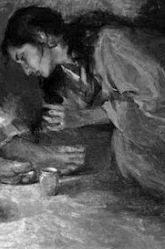
The Reading
The Gospel
John 12:1-8
Six days before the Passover Jesus came to Bethany, the home of Lazarus, whom he had raised from the dead. There they gave a dinner for him. Martha served, and Lazarus was one of those at the table with him. Mary took a pound of costly perfume made of pure nard, anointed Jesus' feet, and wiped them with her hair. The house was filled with the fragrance of the perfume. But Judas Iscariot, one of his disciples (the one who was about to betray him), said, "Why was this perfume not sold for three hundred denarii and the money given to the poor?" (He said this not because he cared about the poor, but because he was a thief; he kept the common purse and used to steal what was put into it.) Jesus said, "Leave her alone. She bought it so that she might keep it for the day of my burial. You always have the poor with you, but you do not always have me."
The Sermon
Random Acts of Kindness
I don't have the best
memory in the world but I believe the phrase 'random acts of
kindness' began in the 1990's. It is defined as doing something nice
for someone for no particular reason. I believe it was a morphing of
the phrase 'random acts of violence'.
Mary performed an act of
kindness by anointing Jesus feet with perfumed oil. It was more than
an act of kindness. It was an act of love. I think she knew his end
was near and this act must have helped relieve some of the ache she
was feeling inside.
Humans have a tendency to
involve themselves with details and there is plenty to argue over in
this story of a woman anointing the feet of her spiritual master with
perfume and wiping his feet with her hair. This act of love is
mentioned in all of the gospels Matthew, Mark, Luke and John. It is
retold differently in each story but we must remember that the
gospels were first told in an oral tradition. Nothing was written
down until well after these events occurred and it is doubtful
whether any of the authors were present during any of the events.
It is not that important
to the message whether it took place in the house of Lazarus, Simon
the leper, or a pharisee. It is not as important if the woman was
Mary, or some other person.
What does ring true in
each of the retellings of these events is that the woman who anointed
Jesus feet loved him and she showed that love by anointing him. After
all, the authors of the bible were not as concerned with details as
they were with the message. So, what can we take away from this.
Why is this story important? Jesus was loved and he allowed his
followers to show their love in many different ways. That is the
same message for all of us. There are many ways to express love.
We can show our love in our own way and Jesus will understand just as
he did with Mary.
Peace,
Fr. Fred

No comments:
Post a Comment